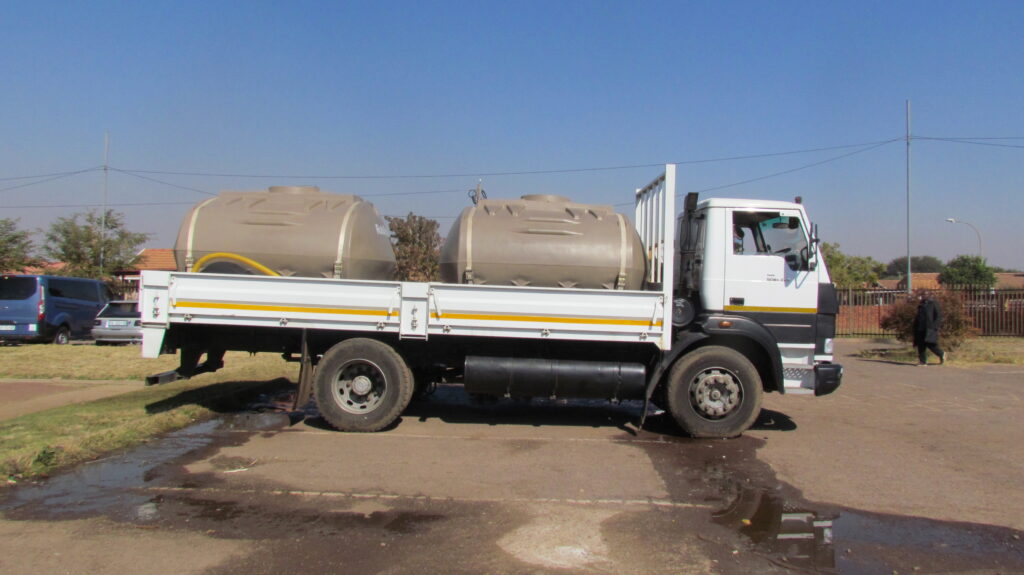
Tshwane Talks spent the whole of Monday 18 June with the suffering residents of Ikageng section in Mamelodi East who have been without water in their taps for four years now.
Residents said they are requested the provincial and national Disaster Management that the water crisis in Ikageng be declared a local disaster because the state of Ikageng water meets the definition of a disaster.
It is alleged this is a man-made disaster.
721 household in Ikageng are affected.
It is alleged councilors and notorious gangsters are allegedly involved in water crisis in Ikageng and surrounding area that are affected in Mamelodi.
It is alleged some councilors from different political parties are making extra cash with the water tanker business.
The unlucky water-deprived residents have to carry buckets, water bottles and push wheelbarrows every day from all over the sections of the area to queue for water that is supplied to them by Jojo tanks at the local hall.
They walk long distances to come and fetch water from Jojo tanks at the hall.
They live in mortgage (bond) houses for which some of them are still paying while others have paid off already.
Yet the last time they washed or took a shower in their bathrooms was in 2020 as there is no water inside their households.
Each time they want to use hot water they are compelled to switch on electricity kettles to boil water as there is no hot water coming out of the non-working geysers.
In some sections in Ikageng water becomes available only in the wee hours of the morning for one hour only and from there it stops coming out completely, while other areas there is nothing coming out of the taps.
The embattled residents spoke to Tshwane Talks regarding the ongoing water crisis on condition of anonymity, this as they fear for their lives.
Each time they speak to the media and reveal their names they get threatened in the form of letters and bullets pushed under their doors, warning them to stop talking about the water crisis or else they will die.
People clad in balaclavas visit them at their homes and warn them not to talk to the media regarding the crisis and at the moment they don’t know what to do and where to go because their water crisis is known by the City of Tshwane Municipality, the Gauteng Provincial government and the national government yet nothing is done about it.
The residents say they are tired of drinking water supplied by Jojo tanks while they have taps in their households.
They live in an urban area, but they feel like they live in a rural area.
They opine that the powers that be should rather proclaim Ikageng section as a rural area because they are virtually living in a rural area due to lack of water in their households.
Some residents told Tshwane Talks that the City of Tshwane seemingly does not know what the cause of the water crisis is in the area.
It is alleged that some Councilors of different political parties are benefitting from the Ikageng section water crisis as they have shares in the tenders that have been acquired by water tankers service providers.
The residents insist that their water supply is being deliberately switched off by someone, somewhere so that those who own water tankers will get richer and richer at the expense of their health and lives.
Residents said there are gangsters that are also involved in this water tankers tender.
Gangsters are busy buying water tankers truck because they see the business and the money, they make from it every month and they are becoming richer every day.
Residents said they don’t trust the water tankers, that is why they don’t drink it, but they use it for bath, laundry, clean, toilets and still spending money buying water.
Residents told Tshwane Talks that they marched many times, send memorandums, petitions but nothing was done until now.
They don’t know where to go and who to approach and they are hoping the new Government of national unity will help them solved the water crisis as everyone fails them for the past 4 years now heading to 5 years without water in the taps.
Some residents end up selling their houses while those who rented rooms tenants have left the area and move to areas where there is water in the taps.
Tshwane Talks readers have been able to read stories in this publication for free for over two years now. We still want our readers to access our stories for free, but we are asking those among our readers who can afford it to contribute at least R30 a month to cover some of the costs of publishing this independent, non-aligned online newspaper which gives a voice to all sectors of society irrespective of race, colour, creed, religion, or political affiliation. You may make your contribution by depositing at least R30 a month into Tshwane Talks' bank account. Details are as follows:
Bank Details
Bank: Standard Bank
Account Number: 10225548834
Account Type: Cheque Account